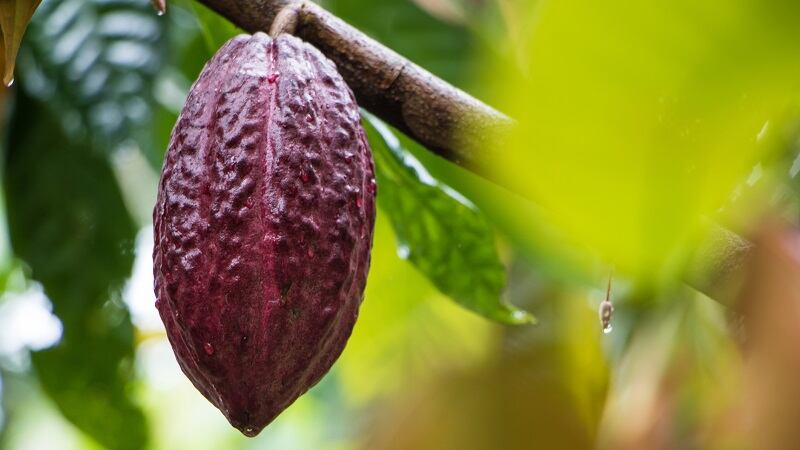Colombia-based Luker Chocolate is addressing cocoa volatility with sustainable agriculture and innovative technology, as the food industry braces for the full impact trade tensions could have on the chocolate supply chain.
The 20 years before 2024, cocoa prices remained relatively stable between $2,000-4,000 per metric ton, Julia Ocampo, VP of cocoa sourcing and sustainability at Luker, explained. However, a combination of disease and climate change-associated weather constrained cocoa supply, increasing prices by three-fold in 2024, challenging CPG companies and suppliers alike, she added.
To manage cocoa volatility, Luker updated its pricing more frequently – from weekly to daily – while also leaning into its relationship with Colombian cocoa farmers and sustainability initiatives.
“It was a very difficult year, but that is when you really feel sustainability - when you really feel that you have the contact with the farmers, the contact with the clients - and that is the moment where we can help and where we can show that we have really strong relationships that we have built for more than 100 years,” Ocampo elaborated.
Luker’s commitment to sustainability amid volatility
Recently, Luker released its annual sustainability report that outlines progress on reaching net zero carbon emissions and boosting the farms that adopt regenerative agriculture practices. These actions create a more sustainable supply chain and reduce volatility in the market, Ocampo explained.
In 2021, Luker joined the Race to Zero campaign, a United Nations-backed commitment from non-government agencies, cities and investors to reduce carbon emissions to zero by 2050. The chocolate supplier set a short-term goal of reducing emissions by 42% by 2030 and achieved a 22% reduction in 2024, Ocampo said.
“Despite volatility, we share a common purpose with our clients, partners and suppliers, securing the future of chocolate. Uncertainty highlighted the importance of the collaborative approach we have always prioritized, reinforcing our focus on long-term sustainability.”
Julia Ocampo, VP of cocoa sourcing and sustainability at Luker Chocolate
Luker sources 100% of its energy from renewable sources and is targeting Scope 3 emissions by improving packaging and logistics, the company shared in the report.
In 2024, Luker moved 80 farmers to regenerative agriculture practices, including agroforestry, organic fertilizing and reforestation, against a goal of 300 by 2027. The cocoa supplier also adopted environmentally positive practices - including ways to improve soil health, proper waste management, composting and other practices – across 12,408 acres compared to a goal of 15,000 acres by 2027.
“Despite volatility, we share a common purpose with our clients, partners and suppliers, securing the future of chocolate. Uncertainty highlighted the importance of the collaborative approach we have always prioritized, reinforcing our focus on long-term sustainability,” Ocampo shared in the sustainability report.
Luker makes ‘The Chocolate Dream’ a reality
Reaching net zero: A roadmap to reduce emissions and increase nutrition security through strategic sourcing, manufacturing and packaging
This story is part of a special collection of articles examining how consumers, brands and reglators are thinking about climate action, including what is and isn't working in the quest to reduce Scope 3 emissions and improve environmental sustainability. The collection also explores how the food industry is balancing the health of people and the planet through ingredient innovation, modern manufacturing and sustainable packaging.
Check out the full collection.
To receive future special editions via email, register for free for FoodNavigator-USA's newsletters. Find out more by clicking the yellow 'register' button at the top of our homepage or by visiting www.foodnavigator-usa.com/info/why-register.
As part of its sustainability agenda, the chocolate supplier supports “The Chocolate Dream,” a program to improve Colombian farmers’ lives through public and private partnerships.
Luker educates farmers on sustainability practices through easy-to-use videos and a gamified platform called “Masters of Cocoa.” The platform provides courses on economics, social and environmental areas - 12 courses on each topic - and rewards farmers with investment money for completing various classes.
“We connect with our farmers, even if they do not have internet access,” Ocampo noted.
Luker Chocolate is investing in technology to manage potential cocoa supply chain complications, including developing an AI application that farmers could use to determine if a cocoa pod is infected with moniliophthora roreri - a fungus found in Latin American that damages cocoa with Frosty Pod Rot disease.
“We are training these machines with pictures to predict disease,” Ocampo noted. “We are developing AI to predict the ongoing disease, and we can be proactive and have early detection of the disease.”


